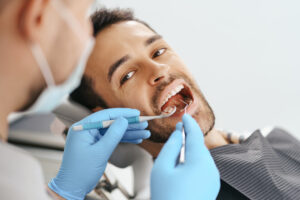Maintaining a healthy mouth and shareable smile doesn’t have to be overly complicated. However, it does take a commitment to caring for your teeth and gums, and the way to do this is through the practice of preventive dentistry.
Everyone is busy these days, and there never seems to be enough time to accomplish everything you want or need to do. With a little planning and building of healthy habits, however, you can keep your teeth and gums in good shape and avoid any complications down the road.
What Exactly Is Preventive Dentistry?
Preventive dentistry is a way to care for your oral health before any serious conditions can develop. It includes thorough examinations, diagnosis, and, if necessary, treatments to set you on the path for optimal oral health over the long term.
The overall benefits of preventive dentistry are numerous and can make all the difference in your dental health. It can also help to significantly decrease your risk of suffering from a variety of physical health conditions, including dangerous heart disease and diabetes, which are now linked to poor oral hygiene.
Preventive Dentistry Components
The components of preventive dentistry include the following.
Regularly Scheduled Dental Cleanings
Scheduling routine (usually every six months) dental cleanings is the first component of preventive dentistry. During these cleanings, your certified or licensed dental hygienist will remove tartar, plaque, and stains from your teeth. While you may be extremely diligent in your brushing and flossing, areas can still be missed, especially along the gum line, and your hygienist specializes in cleaning these hard-to-reach areas.
Each cleaning can help lower your risk for cavities and gum disease and provide an opportunity to evaluate your overall dental health. You’ll also receive tips on how to care for your teeth at home.
Dental Exams
Following a dental cleaning, your dentist will conduct an exam, looking for any developing problems or signs of troubling medical conditions. Specific issues your dentist will be looking for include cavities, occlusion, gum disease, jaw issues, and TMJ disorder. If any issue is identified, your dentist can establish a treatment plan or other preventive measures before the condition becomes more serious.
Oral Cancer Screenings
Beyond ensuring your teeth and gums are healthy, your dentist will need to perform oral cancer screenings on a regular basis. This screening is meant to detect early signs of cancer and, if found, have it treated immediately. This is especially important for those patients who smoke or drink a lot of alcohol.
Patient At-Home Dental Care
Knowing how to care for your dental health at home is another component of preventive dentistry. Your daily oral hygiene habits form the basis of maintaining a healthy mouth and include brushing and flossing to remove food debris and sticky plaque. This practice can help prevent gum disease and tooth decay and help you keep your natural teeth or even crowns or implants longer.
The standard dentist’s recommendation is to brush your teeth twice a day and floss at least once. It is also recommended that you limit sugary food and drinks, as these can cause bacteria growth which leads to the formation of plaque. Your dental hygienist can also provide tips on healthy diet choices to assist long-term dental and oral health.
Special Treatments
Special treatments are often used in preventive dentistry to help protect your teeth from developing cavities and other problems and can be beneficial to both adults and children alike. Two of these are fluoride treatments and dental sealants.
Fluoride treatments are given to protect and increase the strength of tooth enamel and to reduce risks of developing tooth decay. Dental sealants are essentially thin, plastic coatings adhered to the chewing surfaces of teeth and often placed at the back of the tooth where deep grooves are prone to collect bacteria which leads to decay. These sealants can last anywhere up to ten years.
Preventive Aids
In some cases, preventive aids are needed to help protect teeth. Night guards, for example, are tailored for wearing to avoid teeth grinding and jaw clenching (Bruxism) or temporomandibular joint (TMJ) disorder. These mouth guards become a barrier between the upper and lower teeth, decreasing their contact with each other.
Preventive dentistry can make a huge difference in your oral health and in creating a confident smile. With these six components, you can ensure you are providing the best care possible for your teeth and gums not only now but for the future as well.
Begin Your Preventive Dental Care Today by Contacting Stiles Dental Care
When you’re ready to get started with preventive dentistry, Dr. Stiles and his team are here to provide the best possible care available. We offer comprehensive dental care and will help you create and maintain a healthy mouth and a smile you just can’t stop sharing. Contact us today to schedule an appointment.

